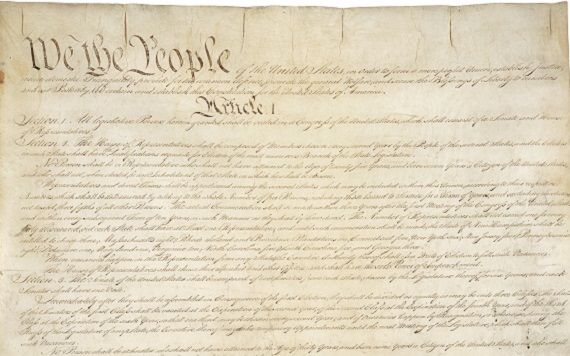In September 2010, the University of Virginia hosted a debate between Abbeville Institute founder Don Livingston and Professor Allen Guelzo, recognized to be one of the foremost Lincolnian scholars in the United States, on the topic “Is Nullification Constitutional?”
Guelzo is as committed to the Lincolnian position of an “indestructible Union” as Livingston is to the compact fact of the Constitution. Students generally agreed that Livingston won the debate, though there were reports that Guelzo stewed afterward because he believed the room had been packed with Livingston supporters.
You decide.







To quote Jed Clampett: “He whipped the tar out of ’em!”
The “problem”
“…Incommensurable theories of the Constitution…”
Compact vs National
Professor Livingston won, in a walk.
But then I believe that which he believes; that is, that there was a confederation (compact of Articles of Confederation) modified toward another confederation (constitution).
I think people like Professor Guelzo believe in nationalism and will defend it with little merit because it is, by being singular, their god.
I suggest to professor Guelzo (ha, ha –like he cares what I think) a reading (and study) of John Remington Graham’s: A Constitution History of Secession.
Not only will he have some valuable comments and footnotes on the subject, but a bit more knowledge on kings and monarchs of which he seems limited in scope.
I would also recommend on that last subject a taste of C.S. Lewis’ comments on the monarch.
Botton line for me: Dr. Livington won. But then it was hardly a fair fight. Marciano against Graziano.
i guess guelzo keeps simply asking is nullification constitutional….regardless of sovereignty but as a compact violation? didn’t some northern states nullify general govt edict in the early 1812 war and was there much stink that occurred then….from the other allegedly violated states?
ky RESOLUTIONS, “…and that therefore this commonwealth is determined, as it doubts not its co-States are, to submit to undelegated, and consequently unlimited powers in no man, or body of men on earth: that in cases of an abuse of the delegated powers, the members of the General Government, being chosen by the people, a change by the people would be the constitutional remedy; but, where powers are assumed which have not been delegated, a nullification of the act is the rightful remedy: THAT EVERY STATE HAS A NATURAL RIGHT IN CASES NOT WITHIN THE COMPACT, (casus non foederis,) to nullify of their own authority ALL ASSUMPTIONS OF POWER by others within their limits: that without this right, they would be under the dominion, absolute and unlimited, of whosoever might exercise this right of judgment for them: that nevertheless, this commonwealth, from motives of regard and respect for its co-States, has wished to communicate with them on the subject: that with them alone it is proper to communicate, they alone being parties to the compact, AND SOLELY AUTHORIZED TO JUDGE IN THE LAST RESORT OF THE POWERS EXCERCISED UNDER IT….., ” does the 9th essentially buttress this? The enumeration in the Constitution, of certain rights, shall not be construed to deny or disparage others retained by the people. the right to nullify iow, not submit to undelgated powers, as madison and otherS had already claimed “not a whole people, but the people of the states”…states ratified the thing in the first place?
i guess distilled: “THAT EVERY STATE HAS A NATURAL RIGHT IN CASES NOT WITHIN THE COMPACT, (casus non foederis,)…..”
not constitutional but held as a natural right of a soverign? so in a sense not part of the constitution but in effect?
I believe Professor Guelzo suffers from a logical misstep regarding his interpretation of the U.S. Constitution’s Article VI and the true purposes of nullification and statehood. In my opinion, the “Supremacy Clause” within Article VI fundamentally stipulates only that the Constitution is the Supreme Law of these United States, thus both State and National Government must be subject to the U.S. Constitution. According to Professor G., nullification is when a State decides to disobey our common Constitution. Untrue. True nullification is this: when the Federal government disobeys the Constitution and violates the supremacy of this nation’s laws as described in Article VI, then the States have both a right and an obligation to declare the actions of the National government unconstitutional and “null and void,” hence the term nullification (For who else can? Very rarely does national government limit itself). In Article VI, I observe not in a single instance where it forbids a State from nullifying unconstitutional actions of the Federal Government. It simply bars a State from disobeying the Constitution, and it calls all members of the National Government to uphold the law, which means, again, to not do anything unconstitutional. What is so evil about a state working to follow the U.S. Constitution? The rights of nullification and secession must be fundamental to the existences of American States, or else these States have no purpose other than being further controlling arms of the National Government, which is tyranny!
[Simply put, Article VI commands that State and Federal Government must be subject to the authority of the Constitution. If the Federal government acts in such a manner that violates the Constitution’s authority, then it is the duty of States to nullify those unconstitutional actions of the Federal government.]